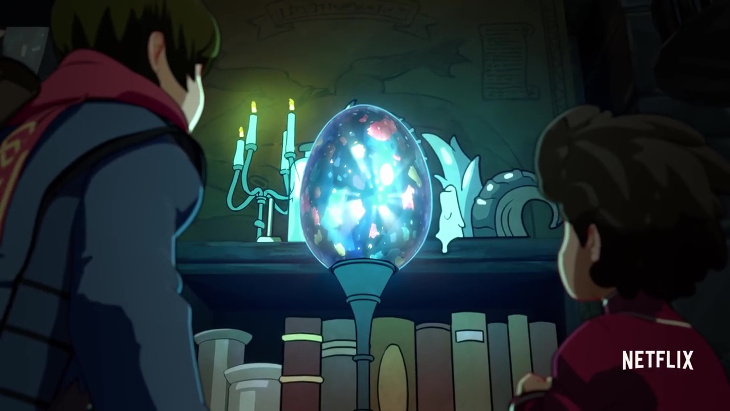
Continuing its trend of supporting creative talents with visions that mainstream television shows no interest in, Netflix has funded the creation of another original animated series from beloved creators. In this case, creators from the original Avatar the Last Airbender bring us a new original fantasy series: The Dragon Prince. With the pedigree of people working on it, its release on Netflix was highly anticipated. Now it is here, and I am going to struggle to talk about it.
The series starts with a somewhat overlong narration of this world’s backstory. In this world, there are six sources of magic: the earth, the sky, the sea, the stars, the sun and the moon. At some point in history (It’s annoyingly unclear) humanity discovered a new source for magic: DARK MAGIC (dun dun DUN!). The new magic source is extremely powerful, but it feeds on the life force of living creatures to work. The other two magical races in this world, dragons and elves, are so appalled by this dark magic that they banish all of humanity to the Western side of the continent. The elves and other magical creatures live on one side of the border, and humanity lives on the other, with the border being guarded by the dragons. Wars break out (I think), and for a while they are quelled by the border’s ultimate guardian, the dragon king Thunder (Insert AC/DC sting here). Somehow humans use REALLY dark magic to kill the dragon king and destroy his only son’s egg to destroy the titular dragon prince.
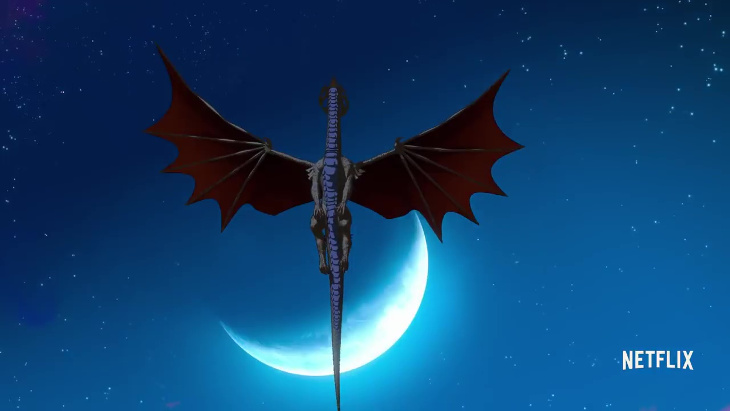
Cut to some time later, where we meet Princes Callum (Jack De Sena) and Ezran (Saha Rojen). The younger prince Ezran is the birth son of King Harrow (Luc Roderique) and the older prince Callum is his step-brother. We learn quickly that a group of Moon Shadow Elves, including the young Rayla (Paula Burrows), have come to kill King Harrow and his sons as retribution for the death of the dragon king and the destruction of the egg. However, not everything is as it seems, and soon the young elvish assassin is traveling with the two princes to potentially avert a new war on the continent.
Before I get into any other criticism, one big clarification needs to be made. Netflix is selling this series with the tagline, “From the creators of Avatar the Last Airbender,” and that might be somewhat misleading. Bryan Konietzko and Michael DiMartino, who created Avatar and its sequel series, The Legend of Korra, are not involved in this series. The Dragon Prince was created by Aaron Ehaasz, one of Avatar’s lead writers/directors, and Justin Richmond, who previously directed the video game Uncharted 3: Drake’s Deception. They cofounded a new animation studio, Wonderstorm Productions, to create this series. This is clearly a passion project for them, and whatever else I say about this series, I hope things work out for them.
I say this is a passion project because everything about The Dragon Prince suggests a clear vision for the world that they want to create. The mythology is well planned if currently somewhat vague. The story is set up well for an expanding scope that starts from a much smaller plot. The action, for a completely CG television series, is actually pretty well done. There are some glitchy movements occasionally, and the camera doesn’t always focus on the right things for maximum effect, but it works out okay. Whether this is because of Justin Richmond’s history with directing CG characters in Uncharted or because the combination of Avatar-like aesthetics with decent CG modeling results in something akin to a cel shading look, I was mildly impressed with Wonderstorm’s first attempt at CG television.
While it is beginner stuff, the character elements do quite a bit to set up drama for the story. The elf Rayla is a particular standout. Her actress gives the strongest performance and her character is the most fleshed out by the end of this run of episodes. There are a lot of fun, subtle expressions with her animation that clearly define her for the audience. The other big standout is General Amaya, the aunt of the two princes. She’s a badass, kind, empathetic, and completely deaf and mute. The character acts out everything through sign language and I am honestly stunned by how much character they got out of her through only gestures, body language, and expressions. I want more of her going forward, particularly since she seems set up to be the obvious human counterpoint to the villainous Viren.
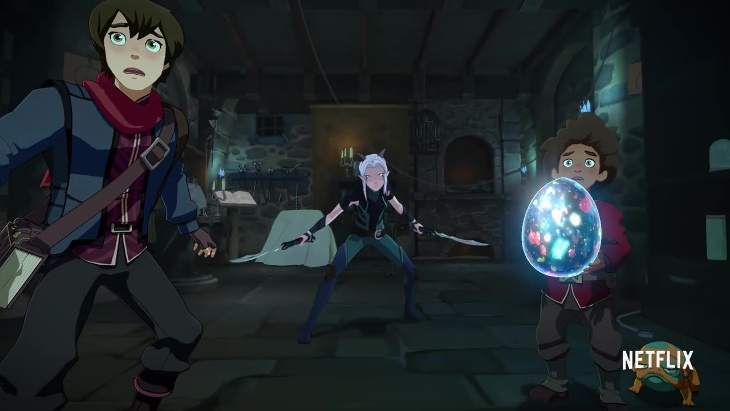
The two princes are rather generic at the start, but the idea of step brothers instead of blood relatives being the family members we follow is an interesting starting point for this epic adventure. The scenes between the older brother Callum and his stepfather King Harrow are too few because they represent the strongest element of the boys’ stories at this point. There are other fun characters introduced in later episodes (often with some unfunny cringey comedy), but they haven’t established themselves well enough yet to assess. If this were the end of the series, this might be a problem, but this is just the first half of what could potentially be six seasons of television. These first nine episodes are part of “Book One: Moon,” a clear nod to Avatar, and moon is one of six sources of magic in this world. So, this is not a big problem yet.
Where problems do start to emerge is in the writing of the actual story. For starters, the history of the world in The Dragon Prince is more than a little confusing given that its overall setup is fairly straightforward. Humans create dark magic, dark magic feeds on the life force of magical creatures, magical creatures hate that, and banish the humans. That seems simple, but then we are led to believe that most humans are basically good beings except for the dark wizards and the humans are just fighting a war with the elves and dragons because the elves are just as nasty and unnecessarily cruel as the humans. They try to sell this with King Harrow and the two human princes being clearly good people, but whenever they talk about the history of humans and magical creatures the fact that humans created dark magic that feeds on life force seems to be an often overlooked detail that no one acknowledges. This plays into the tonal problems as the dark wizard is the obvious bad guy with his soul stealing and dark magic immortality (I’m guessing, but it seems pretty obvious) who does everything humanly possible to convince everyone that he’s the bad guy, but then occasionally talks about human motivations and empathetic goals that do not gel at all with most of his actions. Also, Viren’s two kids are supposed to be villainous henchmen to him, but they are often too comedic to be threatening while also too dangerous to just be jokes.
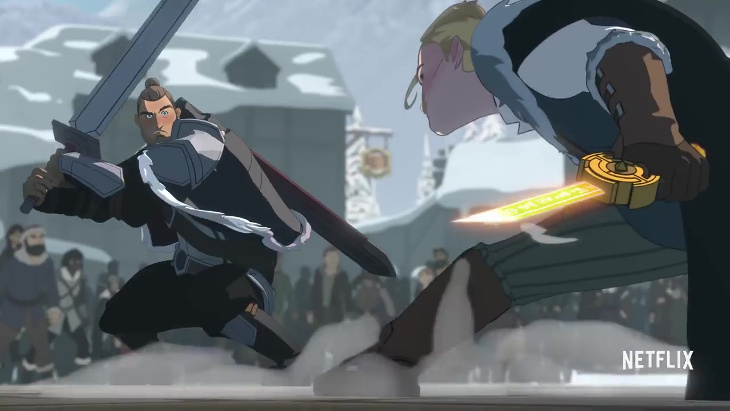
There are also strange plot threads that seem like they were not executed properly. In one episode, the dark wizard Viren showcases his obvious Chekov’s gun, a two headed cobra that eats souls and can exchange souls between two beings, to the king as a possible way to save his life from the onset of Moon Shadow Elf assassins. The king refuses, the assassination happens, but the cobra is never shown again after the scene where it is initially brought up. It’s not even alluded to. Also, the king is murdered off screen. We don’t even get to see the body. We just see proof that Moon Shadow elves succeeded in murdering King Harrow and then cut to the funeral. This is obviously to hide certain plot reveals from us, but the series makes the mistake of not showing us enough to effectively trick us. You can’t pull a plot twist if you are too vague about key plot events setting it up and fail to establish things for the audience.
Also, while I do like the mythos of the series, I cannot deny that it is pulling heavily from more generic Western fantasy tropes. The mythos in question is still incredibly vague at this point, and that is fine, but it worries me how much of the show is falling back on generic Western fantasy tropes already. Avatar the Last Airbender was not mind-blowingly amazing at first either, but it was unique. It’s setting stood out and the nature of it magical powers and creatures were unusual both then and now. Dragon Prince needs to do more to establish the nature of its various races, settings, and powers if it wants to stand out from the fantasy television pack.

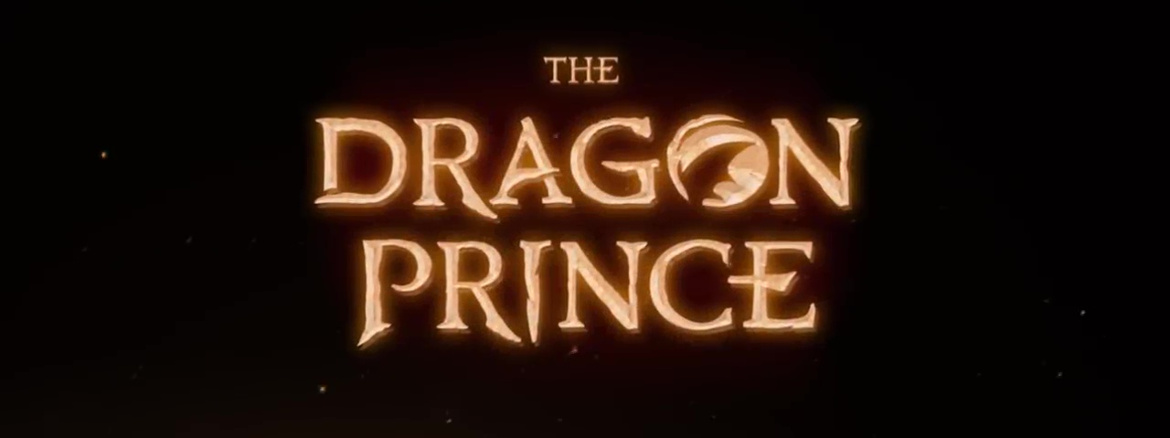
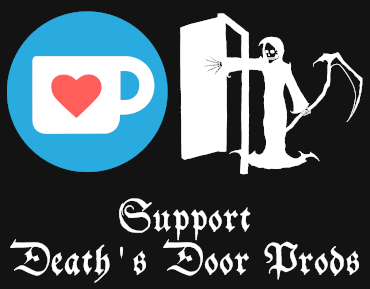

Add comment